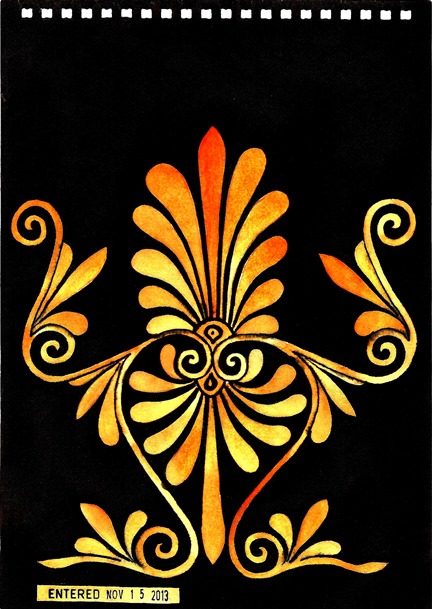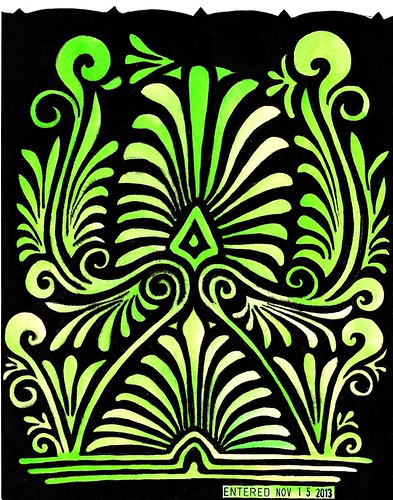The poet Abu 'l-Bakhtarī said: The tales I used to hear of Abū Fahma, a madman of Baghdad with a gift for poetic improvisation, led me to seek him out. Our meeting came about in a lane of the city, where I said to him, "How are you today, Abū Fahma?" He replied in verse:
I have reached the edge of my precipice. Through you
the way lies open to the wellsprings of my ruin.
I see you turning, but not toward me.
Whose heart is least corrupt you least attend.
O you whose estrangement prolongs my pining:
may you be struck with pining worse than mine!
Abu 'l-Bakhtarī said: At this, I withdrew a bouquet of narcissus from my sleeve, and pressed it on him with my wishes that God prolong his life. He stood smelling them for a time, then delivered these verses:
On my wedding day, there came from the South hard-spattering,
black and brilliant [clouds] wreathed with rain.
Then kicked in the East Wind with its fecundating showers,
and the curtailment of our nuptials was hard to bear.
Our babe was born still. Labor pains came on,
and there was parturition, and that was the issue.
Springtime wove a shroud, and as one hand
the dew and breeze gave color to its fabric.
It was this flower's composite yellow, white petals
cupping ornaments of unsmithed gold
on emerald columns raised aloft with the morning,
like unto the sun in eye-like splendor.
Al-Hasan ibn Hāni' [better known as Abū Nuwās] said: I paid a call on Mānī al-Muwaswas, who delivered these verses:
A live man's poem is uttered to you by a dead man.
Stuck between death and life, he stands [right here].
Vicissitudes have whittled his frame, and at his end
he stays in hiding from the rest of creation.
To look me over, inspecting my persona,
is to find not one iota of my former charm.
I then went on [continued Abū Nuwās] until I met Ju'ayfirān al-Muwaswas, an elder of the Banū Hāshim with a speech impediment. Around his neck he wore a golden collar with a silver chain. He asked me, "Where did you crawl out of, Hasan?" "Mānī's house," I answered. "Here's one for Mānī's mother," he said and, calling for pen and paper, told me to write this down:
Under cover of the night, the rooster makes no sound
- except on nights I strive along the pathway to your door.
Not every eyeful leads the peeper to delight!
At night, the joys of bed-rest are what's best,
- except on nights I mount the dark,
desiring you. Braving a pair of linked shackles,
I am playing with my life when I come to you. 'Sweet Hope!'
I am calling out, amid the night's black suit,
to the stoker of the flames licking [this] wretch's heart,
taking no care for his welfare nor his reputation.
For treachery and fickleness your nature is unsurpassed
by all the djinn and mortal men living put together now.
With that [continued Abū Nuwās], he told me to tear up what I had from Mānī, which I did.
I went on until I encountered ‘Adrad the Afflicted. Ringed by a crowd of boys, he was slapping his face and weeping as he wailed aloud, "O people! Bitter is the taste of separation!" So I asked him, "Abū Muhammad [which was ‘Adrad's byname], where are you coming from?" "Seeing off the pilgrims bound for Mecca," he said. "What makes it so hard to bear?" I asked. "Some of my kinsmen travel with them," he said. "Did you deliver a poem on the occasion?" I asked. He responded that he had done so, and recited:
They departed Thursday morning, and I bid them farewell
when, taking up their burdens, they took their leave.
As they turned to go, my soul turned with them.
'Come back!' I said. 'Come back to where?' said she.
To a rattling skeleton empty of blood,
and bare of flesh but for a pair of eyes
washed by grief, and the shell of an ear
defiant in its deafness to all blame."
Continued from The Necklace Without Peer of Ibn ‘Abd Rabbih
For the conclusion to Madmen Who Were Poets, see the (St. Mark's) Poetry Project Newsletter no. 250 (Feb/March 2017), 8-12, where the whole of Ibn Abd Rabbihi's chapter appears with an introduction by the translator. Many thanks to Betsy Fagin





 From a
From a 

